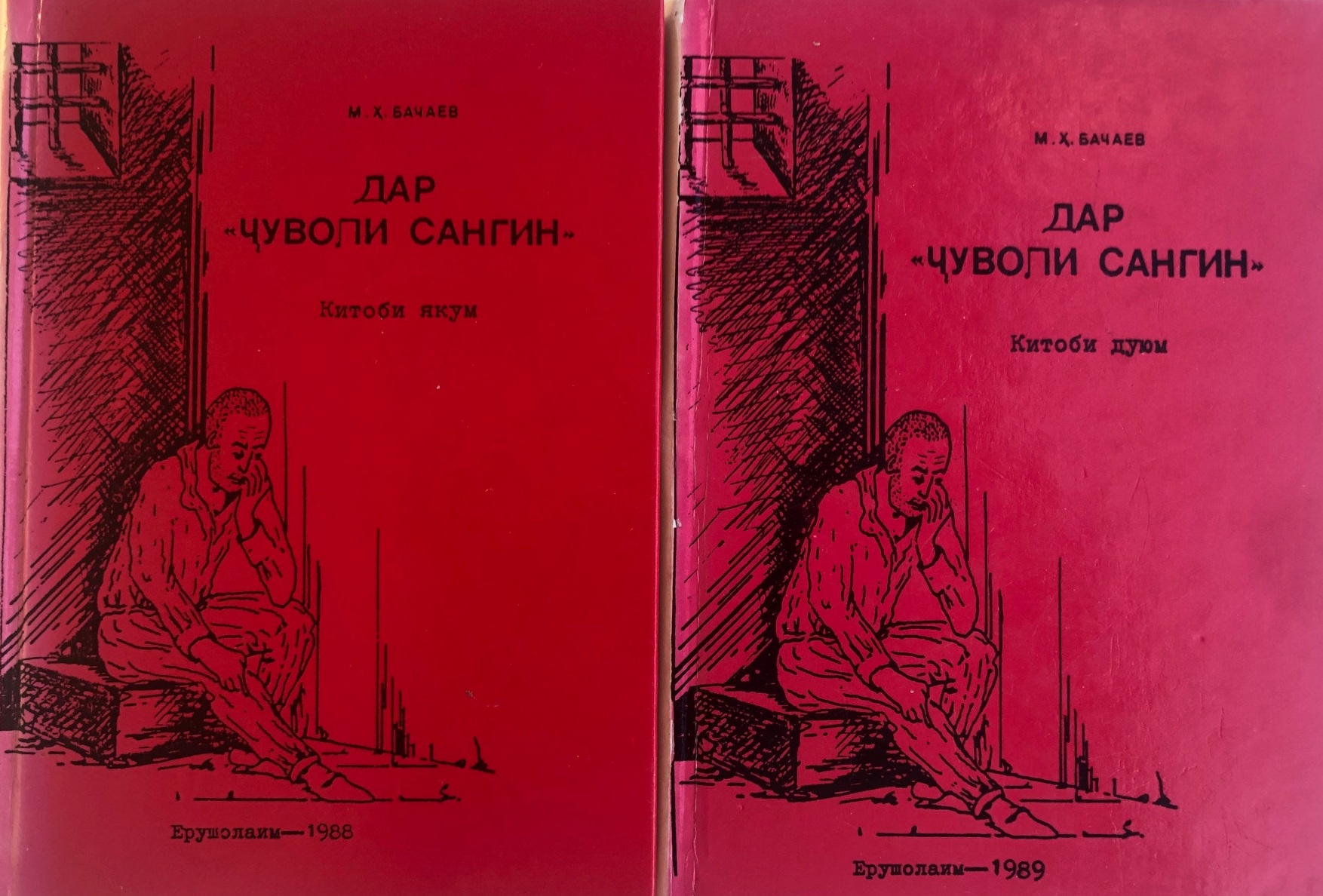
Mordekhay Bachaev: “In the Stone Sack” – A Literary Legacy
Mordekhay Bachaev’s two-volume memoir “Dar juvoli Sangin” (In the Stone Sack) documents his life from 1918 to 1944. Volume 1 covers 1918-1938, describing Bukharan Jewish culture and his early life, while Volume 2 recounts his arrest, imprisonment, and time in a Soviet labour camp in the Urals.
Publication History
After emigrating to Israel in 1973 at age 62, Bachaev received a scholarship from the University of Jerusalem to document his Soviet experiences. He worked for ten years to complete the memoirs. Michael Zand (1927-2019), who had emigrated from the Soviet Union a year earlier than Bachaev, was appointed his editor. 1988 and 1989, the originally handwritten works were printed and published with the support of Bukharan Jewish organizations in Jerusalem (400-500 copies). Hebrew and Russian translations followed in 1990 and 2011 respectively. The Hebrew translation BeTokh Saq ha’Even was accomplished by Mordekhay Bachayev with the help of his brother Yehuda ben Hiyo (who had illegally left the Soviet Union in the early 1930s) and Binyamin ben-David. The Russian translation V kamennom meshke. Kniga vospominaniy was accomplished by Bachayev’s daughter Lydia.
Historical and Cultural Significance
Bachaev’s memoirs provide exceptional value as both literature and historical documentation. They offer unique insights into:
- Bukharan Jewish history and cultural identity
- Soviet Central Asian history (1920s-1940s)
- The rise and fall of Bukharan Jewish cultural institutions under Soviet rule
- First-hand accounts of Soviet prison and labor camp experiences

1) Mordekhay Bachaev, late 1920s with the Bukharan Jewish Newspaper Roshnoi (‘Light’)
2) Sadoji Mihnat (The voice of labour); anthology of poetry by Mordekhay (Muhib) Bachaev, Tashkent 1932
3) Mordekhay Bachaev in Petah Tikva in 2006.
Bachaev's Life and Work
Born in 1911 in Marv (modern Turkmenistan) to a tailor's family, Bachaev grew up and spent his youth in Samarqand’s Jewish quarter. His memoirs cover nearly thirty years (1918-1944), with Bolshevik and Soviet violence as a recurring theme. The text includes not only his personal experiences but also insights into the lives of his relatives, friends, colleagues, and fellow prisoners.
After Stalin’s death, Bachaev was rehabilitated but struggled to find suitable employment in Uzbekistan. In 1954, an old friend from childhood invited him to come to Tajikistan. In Dushanbe (at that time still called Stalinobod), Bachaev was hired at the Institute for Marxism Leninism and translated two volumes of the complete works of Lenin from Russian to Tajik. Bachaev became a renowned and highly respected translator and editor in the Tajik SSR. He also worked for the “Irfon” publishing house and participated in major achievements of the Tajik cultural production, like the Ėntsiklopediya-i Soveti-i Tojik.
In the early 1970s the Soviet Union opened its borders for contingents of Jewish residents. And in 1973, Bachaev and his family emigrated to Israel, where he worked on his memoirs and engaged in various cultural activities. His later works include almost twenty books of poetry and prose, and notably, a complete Tajik translation of the Bible completed in 1989 and published in Stockholm in 1992. Bachaev translated the Old Testament (1380 pages) from Hebrew and the New Testament (461 pages) from Russian.
Literary Legacy
In 2007, Bachaev’s memoirs were included in his seven-volume complete works, spanning over 3,000 pages and showcasing Central Asian literature, culture, and history from a Bukharan Jewish perspective. The collection includes his early writings, poetry, religious works, folklore, and a comprehensive dictionary of Bukharan Jewish terms and expressions with over 7,000 entries.
After the death of his wife Klara, Mordekhay Bachaev lead a retired life, cared for by his daughter Lydia, who is also responsible for the publication of Muhib’s complete works (together with Mikhael Zand). Nevertheless, he was still vividly working, reading and editing when I met him in Petah Tikva in 2005 and 2006. Mordekhay Bachaev died peacefully on March 9, 2007, at age 96, leaving behind an extraordinary literary legacy that documents a unique perspective on Soviet history and Bukharan Jewish culture.



